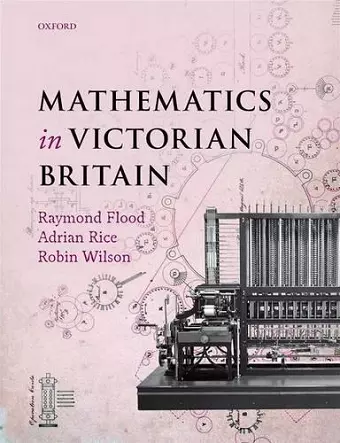Mathematics in Victorian Britain
Foreword by Dr Adam Hart-Davis, Writer, photographer and broadcaster author Robin Wilson editor Adrian Rice editor Raymond Flood editor
Format:Hardback
Publisher:Oxford University Press
Published:29th Sep '11
Currently unavailable, and unfortunately no date known when it will be back

During the Victorian era, industrial and economic growth led to a phenomenal rise in productivity and invention. That spirit of creativity and ingenuity was reflected in the massive expansion in scope and complexity of many scientific disciplines during this time, with subjects evolving rapidly and the creation of many new disciplines. The subject of mathematics was no exception and many of the advances made by mathematicians during the Victorian period are still familiar today; matrices, vectors, Boolean algebra, histograms, and standard deviation were just some of the innovations pioneered by these mathematicians. This book constitutes perhaps the first general survey of the mathematics of the Victorian period. It assembles in a single source research on the history of Victorian mathematics that would otherwise be out of the reach of the general reader. It charts the growth and institutional development of mathematics as a profession through the course of the 19th century in England, Scotland, Ireland, and across the British Empire. It then focuses on developments in specific mathematical areas, with chapters ranging from developments in pure mathematical topics (such as geometry, algebra, and logic) to Victorian work in the applied side of the subject (including statistics, calculating machines, and astronomy). Along the way, we encounter a host of mathematical scholars, some very well known (such as Charles Babbage, James Clerk Maxwell, Florence Nightingale, and Lewis Carroll), others largely forgotten, but who all contributed to the development of Victorian mathematics.
Mathematics in Victorian Britain is one of the most enjoyable books that I have had the pleasure of reading. In both senses of the word, it is most certainly unputdownable. * Graham Wheeler, Significance *
For anyone with the slightest interest in the history of mathematics, this is an excellent volume for dipping into. * Fortean Times *
The book is clearly written and edited ... A must for anyone interested in this period. * Wallace A. Ferguson, Mathematics Today *
414 fascinating pages which keep the reader enthralled like a story, although each chapter could be read on its own ... Would I have bought this book in a shop? YES, absolutely. * N. G. Macleod, Maths in SchoolMarch 2012 *
As a rule of thumb, if one reads a book and is unable to put it down, then it is a good book. In the case of Mathematics in Victorian Britain, I had to put this book down on several occasions; not because I disliked it, but because it inspired me to pick up a notepad and pencil and try several mathematics questions from nineteenth-century exam papers. The fact that I wanted to explore the book in this way, pick it up and carry on reading, is a real testament to how wonderfully good it really is. * Graham Wheeler, Significance *
The period is a fascinating one and the quality and accessibility of the chapters make for an enjoyable and informative read. And through the fine editing of three more historians, Flood, Rice and Wilson, the book succeeds in eliciting the achievements of British mathematics during those Victorian decades when Britain was in its pomp. * Scottish Mathematical Council Journal *
The book can serve various groups of readers: historians of mathematics as well as mathematicians and even general readers. It is published in a very nice and elegant manner with many pictures and diagrams included. * Roman Murawski, Zentralblatt MATH *
Anyone with an interest in history of mathematics, especially British mathematics, will find this text a pleasurable read ... this book should find a place in the personal library of many historians and mathematicians. * Bruce J. Petrie, Canadian Society for History and Philosophy of Mathematics *
ISBN: 9780199601394
Dimensions: 244mm x 184mm x 35mm
Weight: 1118g
478 pages